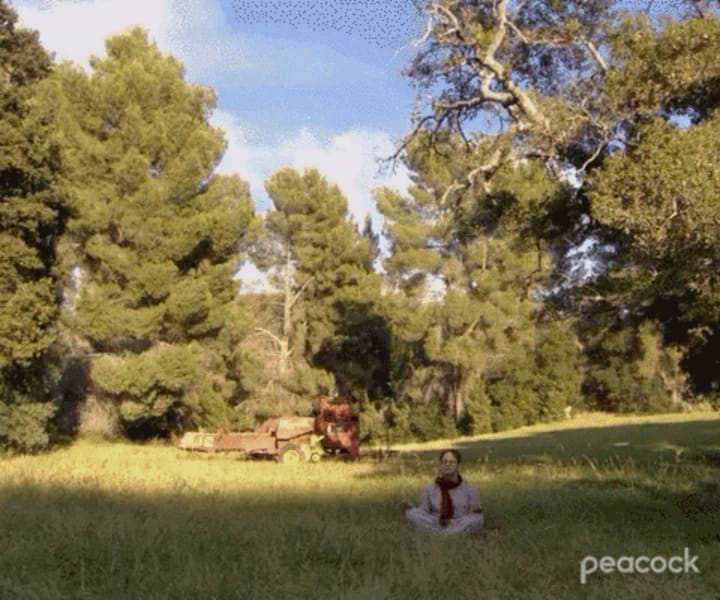A Bachelorette's Guide to Being a Successful Undergraduate (Part 2)
5 Happy Little Accidents to Make in College

Part 2: Happy Little Accidents
If you read part 1, you already know that I tend to bungle it. But, though my college experience was certainly a wild ride chock-full of challenges, it fortuitously always fell short of disaster. As luck would have it, I didn’t quite always make the wrong choices.
Throughout my time bumbling through the college experience, I accidentally fell face-first in the right direction a good number of times, and those happy accidents truly made my college experience worthwhile. You don’t need to stumble though! Instead, heed my advice, practice the jump, and stick the landing.
1. Pen Pal with Your Childhood Friends

This choice saved my first year. All it took was a quick exchange of addresses, and I was chatting with friends in a really meaningful way. When the freshman loneliness set in, I’d then wander over my mailbox and pick up a pile of letters from old friends, and then read about the experiences of the people I grew up with. It was a great reminder that many of the feelings I went through were normal for first-year students. The pen pals became a great way to vent, relate, and feel less alone in a strange new land.
This is also an amazing way to keep in touch with the people you’re close to. Writing letters often feels a lot more personal than a quick text, email, or dm. If the thought of putting pen to paper sounds like an archaic nightmare, though, try scheduling video calls or making in-person visits. No matter your preference, actively keep in contact with your friends!
All those strange, new feelings from traversing college can be rough, but going through it alone makes it way tougher. Let your squad be your ground rod. That way, with each shocking experience, you’ll find great comfort, advice, and support from people that are going through or have gone through the very same things.
2. Volunteer to Help Your Teachers

If you retain a single morsel of knowledge from this article, let it be this: volunteer to help out your professors. Once you find a teacher, TA, or mentor that inspires you, ask if you can work with them. The amount of experience, connections, and exposure to what daily life is like in your dream career is above and beyond anything you usually get in a college course. Plus, if you’re hoping to continue your education to receive a graduate or doctorate, this is a great way to get references and letters of recommendation.
Especially for the STEM majors, this is surprisingly easy to do. More than likely, your teachers have grad students in desperate need of lab or field assistants. Many universities also offer directed research courses in their course catalogs, where you can sign up to get course credit for acting as a junior grad student under a professor. If neither of these is possible, contact a beloved TA, and ask them if they need or know of anyone who needs volunteer assistance.
After taking a biology course that I adored, I reached out to the professor and requested that he serve as the head of a directed research course. What followed was a semester of real fieldwork! The work we did even ended up published in a real scientific journal. Because I chose to take part in this course, it felt as if I was catapulted closer to the world of professional science. At the apogee of that journey, I grazed a stratus of knowledge about my field and discovered a new-found zeal for my major.
And, even after graduating, the connections made during that semester have given me ongoing volunteer opportunities. After college, I’ve continued to assist grad students in his lab, which has been an amazing insight into how graduate school works. It also has become a huge chunk of my resume!
I cannot recommend this enough. Even when teachers didn’t need help, or even at a point, suspended all research due to the pandemic, I was put in contact with other researchers and grad students. I was even forwarded extracurricular jobs and volunteer work! Your professors aren’t just there to talk in your direction in your classes. Reach out to them, and you’ll get so much more out of your college years.
3. Find Study Groups

Cramming can straight up feel like torture in some classes. That stress is miserable, especially when the test you’re about to take is going to make or break your grade. Depending on the class, I attempted this both by myself and with friends. Newsflash: it’s way better with friends.
Aside from the stress relief of laughing about failing together, a good study group will bring all sorts of study tactics to your group arsenal. I remember studying for my plant ecology final with the ideal group. One friend brought snacks and coffee to keep us going, another made flashcards, another supplied music, and only one of us had to lug our textbook across campus. We worked through all the material together and we all landed really solid grades on the final the next day! If it wasn’t for that evening, I might have deeply impacted my GPA.
Studying with a good group also makes it way easier to actually stay up late! Any college student will have a story of falling asleep on their textbook (I know I did). It’s way easier to stay up when you’re laughing and learning in the company of friends.
Plus, one of the quickest and most effective ways to study information is to teach it to someone else. Talking through and explaining material to someone is an amazing way to learn in a time crunch. It’s likely that each person in your study group will have different bits of the material down, so you can take turns teaching each other the tough stuff!
A note of warning: this only works when your study group is a good study group. If your study sessions always evolve into parties, group therapy, or unproductive bickering, look elsewhere. Sprinklings of distraction are normal and serve as a great way to take a break, but the general focus should be actually studying - schedule fun and miscellaneous for a time that isn’t right before your oh-so-important exam.
4. Withdraw from That Awful Optional

In my third quarter, I decided it would be fun to take a beginner’s Yoga class. It had already been a stressful first year, so I figured that having a chill exercise class would end my days on a positive note. My morning schedule was hours of heavy STEM, so meditating and stretching out after that mess sounded like a cure-all.
Then I attended my first class. As luck would have it, I had signed up to learn under a yoga professor with absolutely zero chill. I’m talking, daily grades based on flexibility, a handstand as a final exam for unbalanced beginners, and, for some reason, yelling. One of the best choices I made in my first year was throwing in the towel -and the yoga mat - and switching to independent exercise. That hour I got back was spent walking home instead of taking the bus. In doing this, especially on the prettier routes with natural trails, I found out that I really liked hiking.
If you find yourself in an optional class, especially one that feels like you’re signed up to dive into a dumpster fire on a weekly basis, reclaim that time. If you took the course for a little GPA boost, spend that extra time you now have to study on the stuff that matters. Or, if you’re like my younger self, figure out what you would rather be doing, and then do it!
5. Accept Your Mistakes, Then Keep on Keeping On

No matter how many advice articles, tip listicles, and strategy guides you read, I guarantee that college isn’t going to be a collection of perfect choices for you. You might find yourself failing a class, getting in with the wrong crowd, choosing a schedule that doesn’t work for you, or adding unnecessary stress to your life. Expect it. You’re only human, after all. The transition from high school to college is one where you’re supposed to goof up every once in a while. For most, some sort of childhood safety net will be removed, and that new range of freedom will feel strange.
Remind yourself that it is natural to make mistakes, especially during these years. As soon as I accepted this, I began to have fun with college.
Even with the most egregious mistakes, remember that these years are supposed to be a period of learning. If the mistake is really weighing on your psyche, process through it and find the lesson, but once you know what you should have done, accept that it happened and move on. If you need to, cry it out first or talk to someone, but then forgive yourself and walk on. College is designed to be a place of learning. If your mistakes teach you something, you’re doing it right.
---
Want more advice? Check out part 1!
Like what you read? Send me a tip below to help contribute to my next article!
About the Creator
Olivia L. Dobbs
Science Enthusiast, Naturalist, Dreamer, Nerd.
I crosspost my Medium articles here :)
You can find my main account on Medium: https://medium.com/@oliviadobbs13
Check out my science! -> bit.ly/DobbsEtAl






Comments
There are no comments for this story
Be the first to respond and start the conversation.